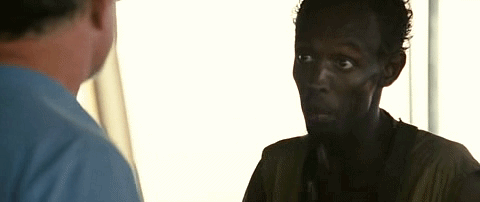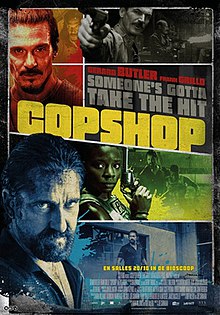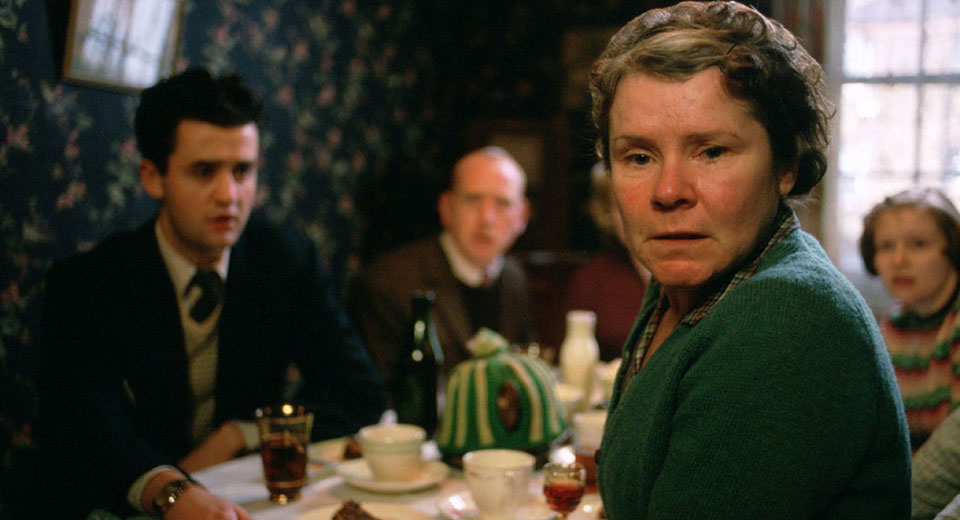Rate The Last Movie You Saw
I've got a backlog of fourteen movies that I never got around to writing about. It stretches back well over a year I think, starting with Psycho. It's been awhile since I watched some of these so I'll try and keep it simple.


Captain Phillips - Simple is a good word to describe this 2013 Tom Hanks thriller directed by Paul Greengrass. Since I found it to be kind of by-the-numbers. Hanks plays Captain Richard Phillips of the container ship MV Maersk Alabama which in 2009 gets hijacked by pirates in the Guardefui channel off the coast of Somalia. Despite attempts to repel them the pirates board the ship and take command of the bridge.
The film was considered both a financial and critical success and it made many critics' Best of 2013 lists. It also earned six Academy Award nominations including Best Picture. For some reason though it didn't fully resonate with me. I don't know what it was. Hanks does his usual dependable job and Abdi turns in a compelling supporting performance. But it somehow failed to completely engage me.
75/100


Captain Phillips - Simple is a good word to describe this 2013 Tom Hanks thriller directed by Paul Greengrass. Since I found it to be kind of by-the-numbers. Hanks plays Captain Richard Phillips of the container ship MV Maersk Alabama which in 2009 gets hijacked by pirates in the Guardefui channel off the coast of Somalia. Despite attempts to repel them the pirates board the ship and take command of the bridge.
WARNING: spoilers below
In the meantime Phillips has instructed the rest of the crew to hide belowdecks. During a search by the Somalis the crew take de facto leader Abduwali Muse (Barkhad Abdi) prisoner. Phillips negotiates with the other pirates for his release in exchange for them agreeing to leave the ship with the 30,000 dollars in the ships safe. During the exchange Phillips is overpowered and forced onboard the lifeboat with the hijackers. The rest of the movie deals with the US navy destroyer USS Bainbridge and it's attempts to stop the craft from reaching the coast of Somalia. In due course SEAL Team Six is brought in and they eventually rescue Phillips, capture Muse and kill the remaining hijackers.
The film was considered both a financial and critical success and it made many critics' Best of 2013 lists. It also earned six Academy Award nominations including Best Picture. For some reason though it didn't fully resonate with me. I don't know what it was. Hanks does his usual dependable job and Abdi turns in a compelling supporting performance. But it somehow failed to completely engage me.
75/100

My God, My God, Why Hast Thou Forsaken Me? (Shinji Aoyama, 2005)
the film follows a couple of noise musicians. i love that. you couldn't appeal to me more with that but unfortunately there's only this one 15 minute chunk of the film that i really, really loved and the rest of it was just kind of whatever.
X
Favorite Movies
X
User Lists

Muppet Treasure Island, 1996
In this Muppet-ized version of the classic novel, young Jim Hawkins (Kevin Bishop) finds himself aboard a ship that is host to a crew of pirates led by the nefarious Long John Silver (Tim Curry). Hawkins is in possession of a map that supposedly leads to a long-lost treasure.
It's probably not fair to compare this film to the Muppet Christmas Carol because that film just fires on all cylinders.
Muppet Treasure Island was enjoyable, but fell a bit short of the goofy good time I was hoping to have with it.
Bishop does a good job in his lead performance as Hawkins, and Curry brings some noise and bravado to his rakish pirate while at the same time conveying that he's cultivated a genuine affection for Hawkins. It shouldn't work that Silver gleefully talks about cutting everyone's throat and then twenty minutes later sincerely swears that he'd never hurt Jim, and yet it does.
The music is okay, though the two early songs ("Something Better" and "Sailing for Adventure") are far more fun and catchier than anything that follows. "Cabin Fever" was okay, and the love song at the end was very meh.
How are the muppets themselves utilized? Okay, I suppose. Who would have imagined that Sam the Eagle would end up being my favorite as an overly strict and literal first mate? Not me! Kermit felt underused to me as the mostly benign ship's captain. Gonzo and Rizzo, originally meant to be the film's leads are also pretty good.
On the negative side, I didn't love the film's portrayal of its indigenous characters. They are this weird mish-mash of Caribbean-type characters and a stereotypical American Indian portrayal. Of course they speak in stilted English, and when one of them said "I see you have boom-boom sticks" I just cringed. The characters feel like a lazy "exotic" soup.
I also have to say this: I do not care for the whole "Miss Piggy as bombshell" jokes. I don't want to see her kissing multiple male (human) characters. It creates this gross dynamic where all of the male muppets are sexually neutral and then the one female muppet has apparently slept her way through a third of the cast. Like, the whole thing of her being overbearing in their relationship and Kermit loving her anyway is whatever, but I thought that in terms of her character there was a weird vibe.
Again, I think that my bar was probably set too high for this film. But I can't help feel that a lot of the elements in it were just a bit off-center of where they needed to be for the film to flow and feel coherent.
X
Favorite Movies
X
User Lists
I will continue to note under every new review of this film that I am REALLY looking forward to it.
X
Favorite Movies
X
User Lists

Northanger Abbey, 2007
In this adaptation of Jane Austen's novel, young Catherine Morland (Felicity Jones) and her brother James (Hugh O'Conor) are invited to spend some time in Bath with family friends the Allens. While there, Catherine becomes friends with Isabella Thorpe (Carey Mulligan) and becomes the object of romantic attention for Isabella's brother John (William Beck). But Catherine's heart pulls her more toward Henry Tilney (JJ Field) and a friendship with Henry's sister Eleanor (Catherine Walker). Unfortunately, Catherine's love of trashy novels has put some dangerous notions into her head, which threaten to derail her blossoming romance with Henry.
I haven't read Northanger Abbey in years, and my memory of it was only liking it medium. My favorite Austen novels are the ones where the main characters are more relatable, and at least in the book Catherine is something of a foolish girl. She has an overfired imagination from all of her reading, and she comes to some bizarre and hurtful conclusions about other people based on her warped worldview.
I really liked what this adaptation did with the story, and specifically with the character of Catherine. It really makes you feel Catherine's youth in a lot of ways. To begin with, Catherine does not totally understand the kind of manipulation that she experiences from John. At one point he lies to her in order to get her to agree to take a ride with him. Then when she realizes he lied to her, he refuses to stop the carriage to let her out. He's a creep and he makes her very uncomfortable, but she doesn't know how to gracefully navigate something that everyone else keeps telling her is flattering interest.
But what the film really does right is take you into the hightened erotic imagination of a young woman whose only ideas about love and romance and sex come from the novels she reads. We get frequent glimpses of Catherine's daydreams and actual dreams, and they are a hoot, but at the same time show the way that her understanding of sex has these lavish trappings. In one sequence she imagines her carriage being attacked by robbers, a handsome man pulling her from the carriage and into his arms. Then there's this great pause, where you can see that Catherine's brain just doesn't quite know what to do next. Likewise she has a dream where she comes on a woman vaguely tied to a bed with a handsome man standing over her. It wonderfully shows the way that a woman in her position has sexual desires, but the only context she's been given for sexual activity are vaguely threatening (abductions, captivity, etc). Like I said, it's funny but it's also empathetic to her character.
There's also something really nice and low-key about her romance with Henry. She makes friends with Eleanor. The three of them take lots of walks in the woods together. Eleanor find excuses to stop and tie her shoelaces to give Henry and Catherine a chance to talk one-on-one. It's all very sweet and charming and for the most part free of unnecessary awkwardness or misunderstandings. Unlike a lot of romantic comedies, their romance is delightfully free of "banter" and genuinely feels like two people just discovering that they really like each other. It helps that the woods where they film these walks are very beautiful.
There were two negatives to the film, and ironically they relate to the film being faithful to the plot of the novel. The joke of the novel is about Catherine getting all sorts of weird ideas about Henry's father having killed off Henry's mother. The film does an okay job of navigating this plot point, wisely making it a pretty minor element (when it is pretty big in the book). But given the very natural way that their relationship develops up to this point, it feels a bit jarring.
The other thing that I didn't love was the treatment of Isabella. Isabella is, undoubtedly, a social climber. She is after a husband who has money, and she has her head turned by Henry's handsome older brother, Frederick (Mark Dymond), leading her to scorn James. The film takes a lot of delight in the fact that Frederick basically leads Isabella on, has sex with her, and then unceremoniously dumps her. But the thing is: why is Isabella's behavior being treated as such a sin? She has no way to assure her own comfort aside from marrying someone who has resources/wealth. There's a little too much joy taken in her downfall, and it felt a bit cruel. Especially since Frederick's equally manipulative behavior is written off has him being just a bit of a player.
These two minor quibbles aside, I ended up enjoying this a lot more than I thought I would. It was mostly kind of low key and sweet.
X
Favorite Movies
X
User Lists

SF = Z
[Snooze Factor Ratings]:
Z = didn't nod off at all
Zz = nearly nodded off but managed to stay alert
Zzz = nodded off and missed some of the film but went back to watch what I missed
Zzzz = nodded off and missed some of the film but went back to watch what I missed but nodded off again at the same point and therefore needed to go back a number of times before I got through it...
Zzzzz = nodded off and missed some or the rest of the film but was not interested enough to go back over it
X
Favorite Movies
X
User Lists
Nightmare Alley (2021)
I liked this a lot, but didn't love it. It's infused with the sort of visual sensibilities you'd expect from a del Toro film, but lacking some of the originality of some of his other films. It's also less sympathetic - the main character's past, character and motivations are deliberately unclear. He's hard to sympathise with, I'm not sure we're meant to sympathise with him, but a couple of the elements don't quite work because I'm not sure why the characters do what they do. It becomes a sort of morality tale. It's a long film and drifts a little at times. The climax of the film is memorable and tense, but the ending goes on for a little too long to try to justify the conclusion that's been inevitable from the start.
I liked this a lot, but didn't love it. It's infused with the sort of visual sensibilities you'd expect from a del Toro film, but lacking some of the originality of some of his other films. It's also less sympathetic - the main character's past, character and motivations are deliberately unclear. He's hard to sympathise with, I'm not sure we're meant to sympathise with him, but a couple of the elements don't quite work because I'm not sure why the characters do what they do. It becomes a sort of morality tale. It's a long film and drifts a little at times. The climax of the film is memorable and tense, but the ending goes on for a little too long to try to justify the conclusion that's been inevitable from the start.
X
Favorite Movies

Lady Chatterly's Lover, 1981
Lady Constance Chatterly (Sylvia Kristel) is married to Clifford Chatterly (Shane Briant), who suffers a serious injury during military service. Paralyzed and impotent, he tells Constance that she should take a lover if she finds a man she desires. What Clifford does not expect is for his wife's affections to land on one of their groundsmen, Oliver Mellors (Nicholas Clay). As strong emotions begin to build on all sides, it becomes clear that the love triangle is not sustainable.
I'd had my heart set on watching the 2006 adaptation of Lawrence's novel, having read a really good review of it years back. This was the only version available on the services I have, and despite the tepid IMDb rating I enjoyed it a fair deal more than I expected. It does have some frustrating drawbacks that keep it from being something really strong.
At points, the film offers an interesting and actually nuanced take on love and lust. Constance doesn't immediately start scouting for a lover as soon as her husband gives her a free pass. In fact, the man who will become her lover crosses her path several times in the film before she even really tunes into him. It is only after accidentally stumbling on him bathing outside his cottage that she begins to consider him as an erotic possibility. Despite perhaps initial intentions to keep the relationship as mainly a sexual release, Constance soon begins to love Mellors. She goes from calling him her lover to calling herself his wife. Mellors also begins to have feelings for Constance, but for him that triggers an avalanche of self-doubt and exposes class resentment.
That question of class is really at the center of the story, and I think that the film did an okay job of exploring it. When Clifford instructs Constance to take a lover, he's obviously not thinking about "the help." The way that Clifford sees the servants is how Mellors imagines that Constance sees him. At one point Clifford refers to Mellors as "living meat", and this is what Mellors fears Constance thinks as well. The question of class and power hovers over the film. Constance, with the right word, could easily have Mellors fired. In many sequences--especially as he begins to suspect their affair---Clifford abuses his position of power over Mellors to cause him physical discomfort and humiliation.
At times I felt frustrated with the way that the film positioned Constance. Clifford's contempt and assumption of superiority feels right. And I felt sympathy for Mellors when he expressed his anxieties about Constance only wanting him for sex and not for who he actually is. But Constance felt a bit more vague. She constantly says things like "Oh, does this class stuff really matter?" and it was disappointing to see through the film that she never seemed to pick up on the fact that, yeah, it does. In fact, we learn a startling fact at almost the end of the film: she never even asked or knew Mellors' first name! Girl! I wish that the writing had done a stronger job of drawing out her character. Too often, her flaws feel like they're being passed off as just her being a dreamer as opposed to exposing her privilege. Because she is contrasted with the much nastier and overtly prejudiced Clifford, she comes off a bit too clean in it all.
As for the sexual, passionate relationship around which the whole film revolves. Eh. In the beginning, I really appreciated what felt like a genuinely two-sided portrayal of burgeoning romance. We get the early sequence of Mellors bathing nude as Constance watches, followed by a sequence of her masturbating to that memory as we suddenly realize that she's imagining her own hands touching his body. After all, her appreciation of his body and their sexual connection is the initial driver of their affair. But after the first third of the film, it's like the camera slides back into typical male-gaze mode. We get repeated lingering shots of Constance lying nude in bed, or undressing. The undressing sequence is sexy and it also has some emotional heft as it is the first time that she spends the night in Mellor's cottage. But the movie just, like, forgets that Constance and her sexual desire is an equal part of this equation. For us to get the entire impact of this first-time domestic moment, we should see him undressing as well, right? But instead we just get a jump cut to yet another scene of man-on-top missionary sex.
And while I know that you have to take a story in terms of the time and place in which it is set, there's just something so pathetic about "penis does't work" = "no sex life." Someone in our friend group posted about a sexual encounter in which her male partner couldn't achieve an erection and then ended the sex in a huff, to which another acquaintance replied, "Oh, and his hands don't work and his mouth was broken?". It's frustrating because in the film Clifford DOES have physical intimacy, albeit mostly in a non-sexual context, as he receives massage and does exercises with his female doctor. The film seemed sort of aware of this contradiction---especially as many of the "treatment" scenes were shot with a lot of panting and sweating and sexual charge--and I genuinely could not tell if there was self-awareness about the fact that Constance and Clifford could have maintained some degree of sexual intimacy with each other. (I know the film was being faithful to the book, I get it, but still!).
Kristel and Clay are both nice to look at and they both have a nice mix of sexual swagger and sensuality that lets you believe that they would spark with each other sexually and even that the sex could lead to something deeper. The sex scenes are nicely shot for the most part and the warm lighting--in contrast to the much colder scenes in the Chatterly home or on the grounds---gives a sense of comfort.
An aspect of the film I really did not care for was the degree to which the dialogue was clearly, CLEARLY dubbed over. With Kristel this was apparently due to her accent, but I found it very distracting.
I haven't read the source material, but this is the kind of film that makes me think I'd probably enjoy the book more. The exploration of the themes of class and sex don't get the full treatment that it seems they deserve. The ending is also incredibly abrupt.
X
Favorite Movies
X
User Lists

Lady Chatterly's Lover, 1981
X
User Lists
How did you see this? I watched Emmanuelle, also starring Kristel, from the same director last year and mostly enjoyed it, even if I had some issues.
X
Favorite Movies
X
User Lists


Vera Drake - Rewatch of one of my favorite "dark horse" British films. The kind that sort of sneaks up on you. There's a bunch of them actually. Probably too many to number but this one from 2004 features Imelda Staunton's deeply moving portrayal of the title character. It's written and directed by Mike Leigh which also sets it apart.
The setting is 1950 London and the working class Drake family are poor but tightly knit and happy. Mother Vera works cleaning houses while her husband Stanley (Phil David) is a car mechanic working alongside his business owner brother. Her introverted daughter Ethel (Alex Kelly) is a factory worker while her son Sid (Daniel Mays) sells and tailors mens suits. Vera is an instinctively kind hearted person, guilelessly doing small favors for people throughout her day. She routinely checks in on an elderly neighbor and makes a point of inviting lonely bachelor Reg (Eddie Marsan) over for dinner where he and Ethel eventually hit it off.
WARNING: spoilers below
Vera also provides another service for impoverished young women in need by helping them to abort unwanted pregnancies. She does it out of altruism and free of charge but Lily (Ruth Sheen), a woman Vera considers her friend, secretly charges the women two guineas. Lily also has a side business selling scarce foodstuffs at black market rates. One of Vera's patients develops an infection and comes close to dying and it isn't long before the police are knocking at the Drake's door.
There's an additional story arc featuring Susan (Sally Hawkins) the daughter of one of Vera's well to do, house cleaning customers. She's date raped by a suitor and ends up pregnant and Leigh uses the legally sanctioned process she benefits from to highlight the disparities and the hypocrisy inherent in the class system of the time.
An unassuming, powerful film anchored by Staunton's letter-perfect performance, a stellar ensemble cast and solid production values.
90/100
I "borrowed" it through Hoopla, which is a service I have access to via my library card. You might check to see if it's something you can get in Canada!
Ah, good to know.
I set up a Hoopla account years ago when my city's library system first got it. Unfortunately, I lost my login details and let my library card expire, so I can't seem to access it anymore, haha.
X
User Lists
The Truman Show
Timeless this movie never seem to get old and pull you in, so emotive, even love the music, we were so lucky to have 90ís Jim Carrey IMO he was just on fire with his very own thing and you gotta respect that.
To think The Mask, Dumb And Dumber and Ace Ventura all came out in the same year ď94Ē and how popular they where is insane
Timeless this movie never seem to get old and pull you in, so emotive, even love the music, we were so lucky to have 90ís Jim Carrey IMO he was just on fire with his very own thing and you gotta respect that.
To think The Mask, Dumb And Dumber and Ace Ventura all came out in the same year ď94Ē and how popular they where is insane
X
Favorite Movies
Ah, good to know.
I set up a Hoopla account years ago when my city's library system first got it. Unfortunately, I lost my login details and let my library card expire, so I can't seem to access it anymore, haha.
I set up a Hoopla account years ago when my city's library system first got it. Unfortunately, I lost my login details and let my library card expire, so I can't seem to access it anymore, haha.
X
Favorite Movies
X





